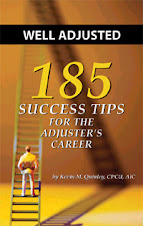Andrew Kaufman is a medical malpractice defense attorney with Kaufman Borgeest & Ryan in
Kaufman suggests that claims people are quicker to forget their victories and successes then that they are to forget setbacks and defeats. Because of the potential of having to report an adverse jury trial outcome to one's boss or supervisor, a subtle but powerful momentum exists to eliminate any risk of trial by settling cases. Let me emphasize that Kaufman is not indicting or criticizing claim adjusters here. He is simply making behavioral observations.
So what do you think? Do reporting structures within claim departments create biases toward settling cases so that adjusters and claim handlers can avoid the stigma of having to report an aberrant result to upper management? Have we become so risk averse in not wanting to be associated with a corporate setback that there are subtle but powerful incentives to over reserve and over evaluate cases to justify higher settlements that would avert the risks of trial? What could insurance companies and claim departments do to remove such a stigma and enable greater but well reasoned risk-taking on the part of the claims staff?
All provocative questions suggested by Kaufman's article in the March 2008 issue of the PLUS Journal.





